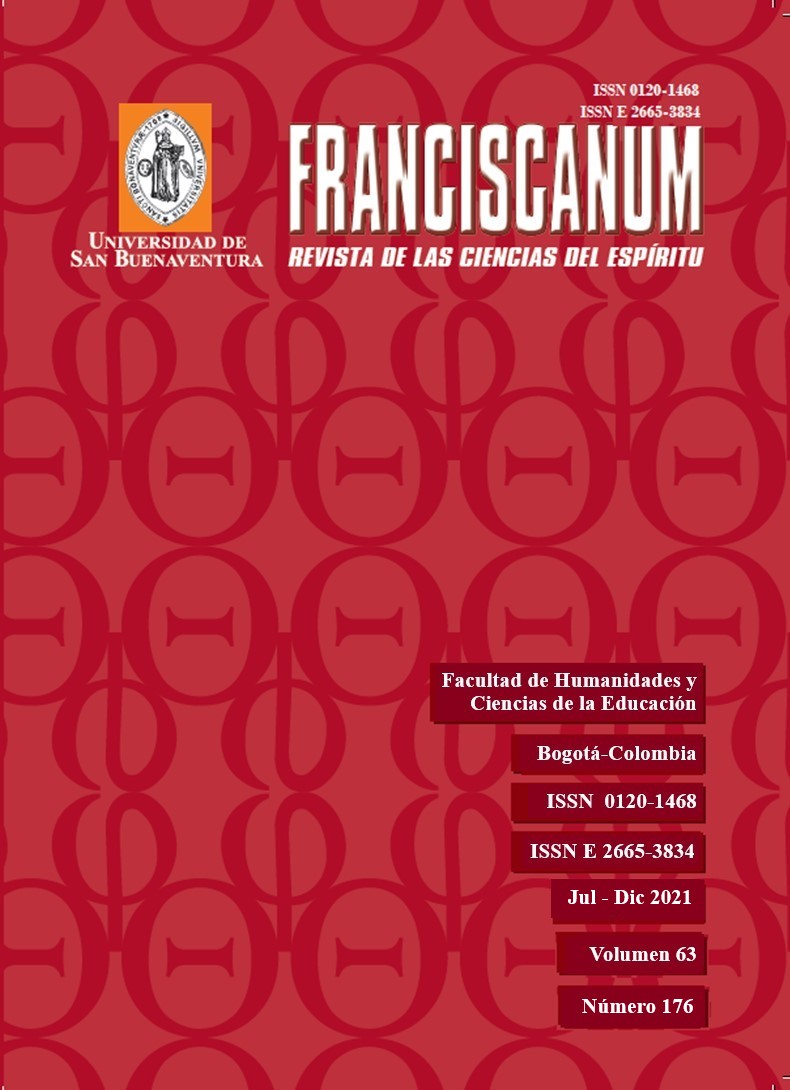This journal provides immediate open access to its content, based on the principle that giving the public free access to research helps a greater global exchange of knowledge.
Therefore, the Creative Commons 4.0 Attribution Attribution - Equal Share (by-sa) License is accepted: The commercial use of the work and the possible derived works is permitted, the distribution of which must be done with a license equal to that regulates the original work.
http://creativecommons.org/licenses/by-sa/4.0/
Along these same lines and in line with the Open Access policy, it is clarified that the authors maintain their rights to articles, without restrictions and, in the same way, they maintain their publication rights, without restrictions. They are only asked to reference the number of the Franciscanum magazine where the article initially appeared.
Abstract
The present essay proposes to rethink the logic that moves the work of Miguel de Cervantes El ingenioso hidalgo don Quijote de la Mancha. The initial proposition that Cervantes and Don Quixote are the same thinker, will bring to what is considered the beginning of the generation of this novel, that is the notion of the occurrence of the inherited mother tongue through the elaboration of linguistic acts and composite thinking. Cervantes' work is presented in this essay as a philosophical proposal to rethink what is commonly understood regarding the nature of the language and the thought.
References
Bergson, Henri. Introduction à la métaphysique. Paris: Presses Universitaires de France, 2011.
Bergson, Henri. Introducción a la metafísica. La intuición filosófica. Buenos Aires: Ediciones Siglo XX, 1956.
Benjamin, Walter. La Literatura infantil, los niños y los jóvenes. Buenos Aires: Nueva Visión, 1989.
Bloom, Harold. El canon occidental. Barcelona: Anagrama, 1995.
Bloom, Harold et alia. Don Quijote alrededor del mundo. Barcelona: Galaxia Gutemberg, 2005.
Breton, Stanislas. «Est-Je suis. Parménide ou Moïse», Revue Philosophique de Louvain 2, Vol. 98 (2000): 235-249.
De Aquino, Tomás. Suma de Teología. Madrid: BAC, 1994.
De Cervantes, Miguel. Don Quijote de la Mancha. Madrid: Alfaguara, 2005.
De Unamuno, Miguel. Vida de don Quijote y Sancho. Madrid: Alianza, 2015.
Dizionario etimologico online. Voz: Prassi. Consultada en octubre 16, 2020. http://www.etimo.it/?term=prassi&find=Cerca..
Foucault, Michel. Las palabras y las cosas. Una arqueología de las ciencias humanas. México: Siglo XXI, 2010.
Goethe, Johann Wolfang. Fausto I. Lima: Pontificia Universidad Católica del Perú, 2003.
Kelsen, Hans. Teoría pura del derecho. Buenos Aires: Eudeba, 1960.
Kirk, Geoffrey y Raven, John. Los filósofos presocráticos. Madrid: Gredos, 1981.
Lacan, Jacques. Psicoanálisis Radiofonía & Televisión. Barcelona: Anagrama, 1993.
Lacan, Jacques. «Seminario 17», Seminarios de Jacques Lacan. Consultada en octubre 16, 2020. https://www.bibliopsi.org/docs/lacan/20%20Seminario%2017.pdf.
Ortega y Gasset, José. Meditaciones de Quijote y otros ensayos. Madrid: Alianza, 2014.
Péguy, Charles. Œuvres en prose complètes I. Paris: Gallimard, 1987.
Péguy, Charles. Œuvres en prose complètes III. Paris: Gallimard, 1992.
Platón, Diálogos II. Madrid: Gredos, 1992.
Spitzer, Leo. «El perspectivismo lingüístico del Quijote», Centro virtual Cervantes, Instituto Cervantes. Consultada en octubre 11, 2020. https://cvc.cervantes.es/literatura/quijote_antologia/spitzer.htm
Wilde, Oscar. El retrato de Dorian Grey. Miami: El Cid Editor, 2009.
Zambrano, María. España, sueño y verdad. Barcelona: Edhasa, 2002.
Zambrano, María. Pensamiento y poesía en la vida española. México: La casa de España,1939.

 Perfil Google Scholar
Perfil Google Scholar


















